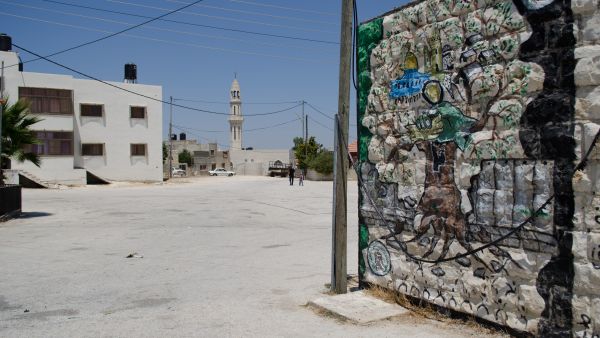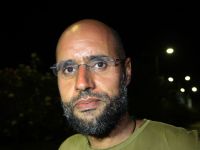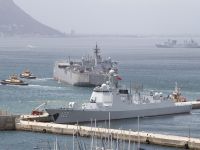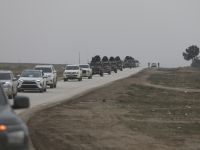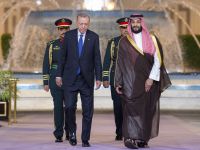Nabi Salih’s main square sits about 50 meters from the 19th century Ottoman shrine dedicated to the prophet of the same name. It surrounds a circular grove of palm trees and overlooks the local mosque. On Friday, August 9, it was silent. Besides a few villagers walking home from afternoon prayer, it was deserted also. For the first Friday in nearly four years, there was no protest.
Inhabitants of the Palestinian village, located about 20 kilometers northwest of Ramallah, began weekly protests in December 2009, when a nearby Israeli settlement seized Ein al-Qaws Spring, which had supplied the farming community with water for irrigation.
As their Olive trees withered, many Palestinians fled. “Most of the people who left went to Jordan. But some went to Gulf countries as well,” said Iyad Tamimi, 45, who remained in the village and often leads the Friday protests. According to Iyad, about 630 people still live in the village. For them, survival is resistance.
Halamish, the Israeli settlement just south of Nabih Salih, was created in 1977. According to international law outlined by the Fourth Geneva Convention, Israeli settlements like this in the West Bank, as well as in the Gaza Strip, Golan Heights and East Jerusalem, are illegal. Despite affirmation by the U.N. Security Council, U.N. General Assembly, and International Court of Justice, Israel disputes the illegality of settlements in territories acquired after the 1967 war, saying they do not apply to the Fourth Geneva Convention because no sovereign government therein exists.
Since Halamish’s inception, and more frequently since the spring was confiscated in 2009, Palestinians from Nabi Salih say they have been terrorized by settlers. “One year ago, settlers rode in at night on bicycles and tried to burn down the mosque,” said Naji Tamimi, 51, a cousin of Iyad. “And we can no longer use the southern part of our land because they burned down the trees that were there.”
Water has been a crucial factor in the villagers’ attempt to survive. According to Naji, Nabi Salih is allocated 12 hours of water usage per week, and that 12 hours comes only on Sunday. “We are hardly ever able to fill up enough water to last the week,” he said. According to Naji, Halamish has no such water restrictions.
What’s more, Naji said that Israeli Defense Forces often drive into the village at night with tanks of “skunk water,” a foul substance leaving everything it touches with a horrible smell, spraying it onto houses and water tanks that villagers keep on their roofs. Although skunk water is not poisonous, Naji said that after their water tanks have been sprayed, many villagers cannot stomach the smell enough to drink what’s inside.
The protests have a history of violent suppression. Villagers gather at the main square after Friday prayer, and are usually joined by a handful of internationals: activists, journalists, and the generally curious. The crowd then marches down the road, or down the hill on the opposite side, to Ein al-Qaws Spring, where IDF soldiers meet them, often firing teargas canisters and rubber bullets into the crowd. On several occasions, they fired live ammunition.
“We have had two martyrs,” said Iyad, before telling the stories of Mustafa and Rushdi Tamimi, who were killed in 2011 and 2012 respectively. Mustafa died after being shot in the face by a teargas canister. Rushdi, according to Naji, was shot twice in the back, first with a rubber bullet, then with a live round; he died in the hospital two days later.
Iyad said that 140 Palestinians from Nabi Salih have been arrested at protests in the last four years, including 35 children under the age of 18. The IDF has not been shy about arresting international and Israeli protesters from the crowd as well. On August 2, palsolidarity.org reported that Israeli troops fired rubber bullets, sound bombs, and skunk water at the demonstration, before arresting four Israelis who took part.
Protest vacation
The reason for the protest’s cancellation on August 9 was that the Friday fell on the first day of this year’s Eid al-Fitr, the Islamic holiday marking the end of the holy month of Ramadan. “During protests, Israeli forces close down the roads,” said Naji. “Many of us have family coming in and out of the village to celebrate Eid, so we could not risk the soldiers shutting down the roads.” Naji said that in the past, the first day of Eid never fell on a Friday, so protests continued normally.
The Nabi Salih-Halamish settlement dispute comes amid ongoing peace negotiations between Palestinian and Israeli officials, brokered by Washington and U.S. Secretary of State John Kerry.
Iyad said he is suspicious but hopeful of U.S. involvement in the deal. “The U.S. has been a major problem because they support Israel in everything,” he said. “But they can have a good impact because they have the ability to pressure the Israelis.” Iyad expressed frustration, though, because the solution being discussed seems to be a two-state solution, which he said will never work. “Any two-state deal will be an Israel victory because they will take the most fertile land and leave Palestine even more divided, with even more checkpoints and travel restrictions,” he said.
But Iyad and Naji conceded that they have no influence over what their representatives decide in the peace talks. All they can do is defy the occupation by not leaving their home, even as settlements siphon off their means of survival. “We cannot leave because they want us to leave or to die,” said Naji. “We want to end the occupation. We want to live like any other people in the world. We want our rights.”


